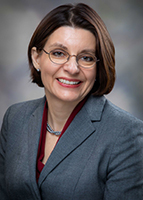We educate future health care providers and scientists. Our faculty members conduct biomedical research that will assist in the prevention, diagnosis, and treatment of periodontal disease. Our clinicians provide competent oral care and promote health awareness, education, and practices in order to improve the wellness of our South Texas community.
Research
The research division carries out basic and applied research in aspects of bone biology, inflammation research and extracellular matrix biology, related to regenerating new bone, controlling the loss of bone under a variety of conditions and bone, and ridge augmentation in periodontal patients.
Faculty
Our faculty are internationally recognized as authorities in the field, with research into the link between oral health and diabetes. They are editors of textbooks, authors of scientific publications, leaders of national and international dental organizations, and researchers who continuously contribute to the body of knowledge in periodontics and dental hygiene.
Dr. Angela Palaiologou GallisPeriodontal disease is a disease of the gums and bone that support the teeth. It is very important that physicians and dentists work together for the overall health of their patients.

